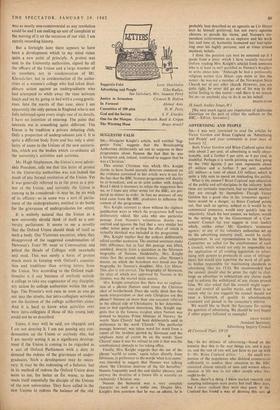Suggestio Falsi Lord Shackleton Advertising and People Giles Radice,
Ian Sainsbury, Mrs. Susanne Perry
Justice in Jerusalem Clement R. If alfon In Ferment Ahmed Anis Committee of 100-plus D. W. Peetz God and the Soviets S. V. Utechin One for the Morgue George Booth. Basil A. Cripps The Witching Hour Bruce Arnoli
SUGGESTIO FALSI
SIR,—Margaret Knight's article, well entitled 'Sug- gestio Falsi,' suggests that the Broadcasting Authorities deliberately set out to suppress in their programmes about Nansen the fact that he was a humanist and, indeed, 'contrived to suggest that he was a Christian.'
This sinister Christian bias which Mrs. Knight claims to have found scarcely deserves comment on the evidence contained in her article were it not for the fact that the BBC features programme will shortly be re-broadcast; and as its joint author with Angela Read I think it necessary to refute the suggestion that we, or I hope any other writer for the BBC, are pre- pared to distort to order In fact no pressure of any kind came from the BBC producers to influence the content of the programme.
Mrs. Knight attempts to show without the slightest justification ways in which the programme haft been deliberately edited. She asks why one particular passage from Nansen's voluminous diaries was omitted and ignores the fact that a very similar but rather better piece of writing the effect of which is virtually identical was included in the programme.
Mrs. Knight implies that the authors deliberately edited another quotation. The omitted sentences make little difference, but in fact this passage was lifted, unedited, directly from a quotation in the Sorenson biography of Nansen. Incidentally, Mrs. Knight states that the second main source, after Nansen's diaries, on which the broadcast was based was the biography by Nansen's daughter, Mrs. Liv Hoyer. This also is not correct. The biography of Sorenson, the plan of which was approved by Nansen in his lifetime, was the second main source.
Mrs. Knight complains that there was no explana- tion of a phrase Nansen used about the Christian ideal of brotherhood. Does she really think that this needs interpretation or that only Christians use this phrase? Nansen on more than one occasion referred to the ethical side of Christianity. In her determina- tion to find significant distortions, Mrs. Knight sug- gests that in the famous incident when Nansen was pressed to become Prime Minister of Norway the words 'State Church' had been deliberately used in preference to the word 'Church.' This particular passage, however, was taken word for word from a report of the incident quoted by Sorenson and the emphasis must of course be on the words 'State Church' since it was his refusal to join it that was the constitutional obstacle to his taking office.
Finally, Mrs. Knight suggests that the use of the phrase 'world to come,' again taken directly from Sorenson, in preference to the words 'what is to come,' was intended to suggest that Nansen was talking about 'the Christian doctrine of the life hereafter.' Nansen frequently used this and similar phrases, and anyway the doctrine of a future life is scarcely an exclusively Christian one.
Nansen the humanist was a very complex character as well as a noble one. Despite Mrs. Knight's firm assertion that he was an atheist, he is
probably best described as an agnostic as Liv Hoyer says he himself preferred; but not every agnostic chooses to parade his views, and Nansen's tre- mendous achievements as an explorer and his work for, and love of, humanity transcend any hair-split. ting over his highly personal, and at times almost mystical, beliefs.
I think the position can best be summed up it quote from a letter which 1 have recently received (before reading Mrs. Knight's article) from someone who is at least as well qualified as Nansen's daughter to write about him: 'Although he had a profoundly religious nature (Liv Hoyer says more or less the same)—he was not a member of the Norwegian State Church nor of any other church. However, you are quite right, he never did go out of his way to stir active feeling in this matter—and there is no reason for us—or anybody else to do it on his behalf.
SHACKLETON
38 South Audley Street, WI
[We very much regret any imputation of deliberate distortion on the part of either the authors or the BBC.—Editor, Spectator.]


































 Previous page
Previous page